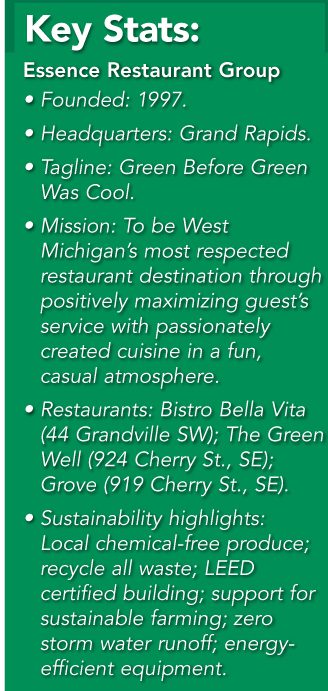
 The past year has been monumental for Grand Rapids-based Essence Restaurant Group: It celebrated its 20th anniversary, announced it was adding a fourth property to its roster and dived deeply into its longtime commitment to sustainability. After all, this is a company that proudly brags it was “Green Before Green Was Cool.”
The past year has been monumental for Grand Rapids-based Essence Restaurant Group: It celebrated its 20th anniversary, announced it was adding a fourth property to its roster and dived deeply into its longtime commitment to sustainability. After all, this is a company that proudly brags it was “Green Before Green Was Cool.”
The icing on the cake was receiving in January 2016 its B Corporation certification, a widely respected and acknowledged criterion for social and environmental performance, accountability and transparency. To receive
this designation is a challenge and then some. To be a Certified B Corp, a
company must meet high standards as set by the non-profit B Lab, including meeting a certain score on the B Impact Assessment, which measures a company’s impact on its workers, community and environment.
Accomplishing the B Corp certification was just the first step, says Essence Restaurant Group sustainability director Lauren Jaenicke. Now, the real work begins. Finding new ways to engage its employees in its sustainable practices, developing new programs and advancing others to push its B Corp score even higher, as well as helping other businesses follow this path, are the tasks Jaenicke and Essence owners James Berg, Patrick Wise, Jeff Gottlieb and Jeff Gietzen have set for themselves for this year and those to come.
“B Corp certification has its perks for us as a company,” Jaenicke says. “One of the most important is differentiating us from our competitors. We live in an incredible community full of fantastic artisans, markets and restaurants. Saying we completed our certification makes us a bit different and gives us a competitive advantage.

“But what’s even more important to us is that there is strength in numbers,” Jaenicke adds. “Our ultimate goal, along with that of the other B Corp companies, is to get more people in that community. It’s right there in the B Corp philosophy: Business as a force for good. That statement couldn’t be more true. Historically, the modern environmental movement has seen business as the bad guy. The other side always was the environmentalists, and they’re always seen as butting heads. Instead, we’re saying we can do this together.”
Having passed the rigorous certification process, Essence Restaurant Group joins a select group of nearly 1,500 companies worldwide and one of only 11 in Michigan committed to redefining success in business. Some well-known Michigan B Corps include Cascade Engineering, Brewery Vivant, Bazzani Building Co. and Catalyst Partners LLC. There are B Corporations from more than 120 industries and nearly 50 countries; a great deal of the certification’s new growth is happening internationally, according to Katie Holcomb, director of Communications for B Lab in Wayne, Pa.
Why does a B Corp designation matter? One reason is that it can play an important role in hiring, marketing and advertising. A 2014 study by Nielsen found that more than half of global online consumers would pay more for products and services provided by companies that are committed to positive social and environmental action. And a recent Harvard Business Review study noted that some 70 percent of millennials want to work for a company where they feel like they’re making a difference.

There is a complementary yet separate designation known as Benefit Corporation. To legally become a Benefit Corporation, a company needs to make sure its home state acknowledges it as a valid business structure. While some 30 states and the District of Columbia now recognize benefit corporation status, Michigan’s legislation has stalled.
Companies of any size, structure, or location may be certified as B Corporations. But gaining traction has become easier with the addition of iconic brands like Eileen Fisher, Patagonia and Ben & Jerry’s, all of which use their B Corp status as a platform for collective leadership in striving toward industry-wide and systemic change, B Lab officials say. Its vision is that one day all companies compete not only to be the best in the world, but the best for the world and “as a result society will enjoy a more shared and durable prosperity,” according to its website.
The first B Corp was certified in 2007, one year after the group started. Holcomb said the types of companies receiving certification are becoming more complex in recent years, a sign to B Lab that the designation has gained ground both with businesses and with the public in terms of understanding how this label has deeper meaning. It is, as Holcomb says, the “Gold Star” of certification.
“We’re seeing larger companies, more well-known companies, as well as companies on the public market joining the B Corp movement,” Holcomb says. “Ultimately, our goal isn’t necessarily to have every company certified or to have all business try to be certified. It’s about making a larger culture change and changing institutions so all companies look at success in a different way. It’s more than just profit. It’s making a positive impact.”
To understand how Essence Restaurant Group feels about its recent B Corp certification, a food analogy may help. For a company that was founded on the basis of sustainability, the triple bottom line and accountability to its communities, having a B Corp designation is better than sliced bread, says Essence Restaurant Group sustainability director Jaenicke.
Essence Restaurant Group properties in Grand Rapids include two on Cherry Street SE —The Green Well and Grove—and a third, Bistro Bella Vita, which is downtown at 44 Grandville SW, next to Van Andel Arena. Last summer Essence announced its intention to build its fourth restaurant at 816 Monroe Ave. NW, in a 5,200-square-foot building under construction at the 616 Lofts on Monroe residential development project.
Jaenicke, who has worked for Essence since 2008, began there while deciding what she wanted to do with her undergraduate degree and where to go to school. She ultimately picked Aquinas, a small college in Grand Rapids, where she received her Bachelor of Science in Sustainable Business. At that point, she says, she wanted to return to Essence because its values aligned closely with her own.
“(The owners) were always saying to me: ‘Why do we exist”—one of those big-picture questions. And the answer always was: ‘We exist to make people’s lives better’,” says Jaenicke. “James and our staff never lose focus on that. It’s always been about more than a great dining experience.”
She says Berger had a talk about the need for ways to measure, to make sure the restaurant group was doing the right thing.
“That is when we started talking about the B Corp idea,” she says, admitting that she thought at first it was an idea that was out of reach. “I thought only companies like Ben and Jerry’s and Patagonia can do that!”
But the owners persisted and Jaenicke went through an online assessment that B Lab offers on its website. The score was so positive that the process continued, a journey toward certification that Jaenicke says included a full nine-month assessment, a very detailed process that includes about 300 questions covering all of a company’s systems, from financial issues to corporate governance and employee engagement.

“I’m so thankful James and our staff supported the process,” says Jaenicke. “They were my cheerleaders. I truly believe that if a company’s leaders don’t have sustainability in mind, if they’re not invested, it won’t work. It has to come from that higher level place.”
The next steps for Essence Restaurant Group are simple, she adds.
“From an internal standpoint, we want to increase our score. We’re looking at these low hanging fruit opportunities; they’re quick and easy changes without big investment. If we can save money there, then we can use it toward larger opportunities,” Jaenicke says. “We’ve got a fourth restaurant on the way and we’re looking forward to the future. But that makes you ask: How does a fourth restaurant fit into all of this? To be honest, it makes me a little nervous. But I’m also excited to see what we can do from here.”
In the meantime, the company is now part of a committed group of Grand Rapids-area businesses that sought to have the B Corp status and to stay in touch with ways to maintain and build on that commitment, says Kris Spaulding, co-founder and director of Sustainability at Brewery Vivant, a brewery and restaurant known for its funeral-home location and a B Corp since 2014.
What makes Vivant unique is the way it approaches its craft and operates the business, the core of which can be found at the crossroads of three passions: a love of the tradition and artistic approach of the Belgian and French styles of beers; running the business according to the three pillars of sustainability – Environmental Integrity, Social Equity, and Economic Viability; and a focus on sharing the experience of how beer and food can be paired to uplift the enjoyment of both.
Since opening in 2010, Brewery Vivant has published an annual sustainability report—”Beer the Change”—which documents its progress toward 12 sustainability goals, including producing zero waste, 90 percent of its business done with local suppliers, 10 percent of profits to charities and 200 volunteer hours. Moreover, Brewery Vivant is said to be the first commercial brewery in the country to receive LEED Silver Certification from the U.S. Green Building Council.
Spaulding says Brewery Vivant chose B Corp certification to protect its core mission of sustainability, to strive for continuous improvement in its commitment to the triple bottom line and to be connected to a network of like-minded organizations. As part of its company mission, its owners believe a great business exists because of the support of the community. “A business should be an active extension of the community and should strive to find meaningful ways to give back to it,” according to its B Corp statement.
Having a B Corp status has been beneficial in a myriad of ways, Spaulding says. She welcomes Essence Restaurant Group into the fold of area companies that have embraced this movement and how it affects their outlook.
“It’s about having access to other companies whose values align with ours,” Spaulding says. “We didn’t know to expect the networking piece. It has been amazing to have access to other businesses that have similar values that we do. We get together monthly, and we have access to the others globally through B Lab and its B Hive (a virtual gathering space for B Corp companies to discuss everything from hiring to certification to opportunities to connect).”
Spaulding says she also appreciates, as a business owner, the connection to other B Corps so she can ask questions, address concerns and find solutions to issues in every area of her business.
“It helps us focus on the next steps and best practices,” she says. “It’s a lot better than ‘Googling’ a question and searching through thousands of Web pages for an answer that might not be there. I can reach out to the other B Corp companies and ask anything. If I need a wellness program, I can ask for examples and how they handled it. It’s huge.”
It also dovetails with Brewery Vivant’s desire to have a continuous improvement model that goes along with the B Corp philosophy, Spaulding says, of an ongoing process that has rewards far beyond the initial
“I have seen the pride of our employees when they talk about the B Corp certification with patrons,” Spaulding says. “When you first receive certification, you have to bring people along on what it means. So it’s been great to see our employees embrace it and share it with others.”







